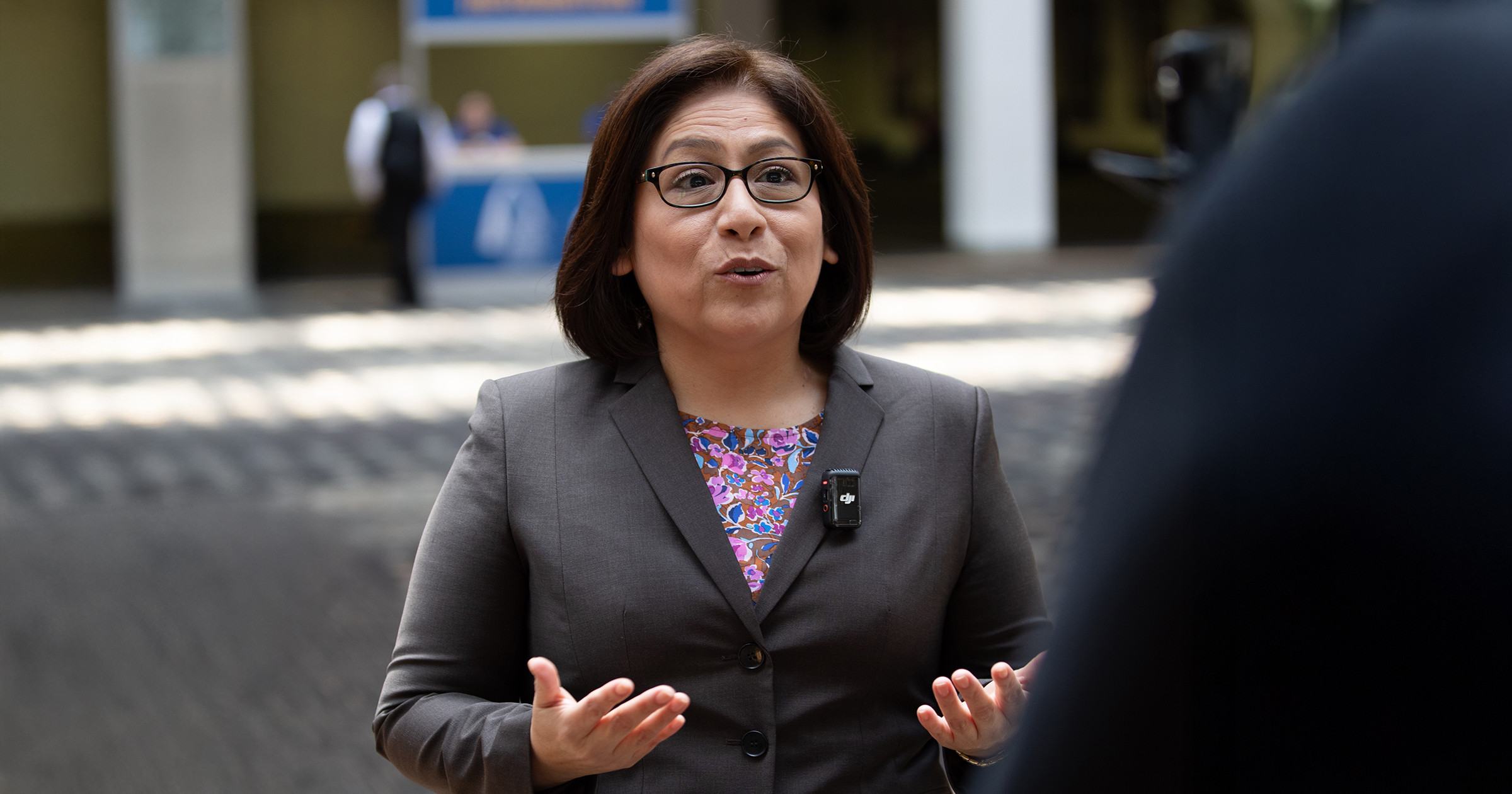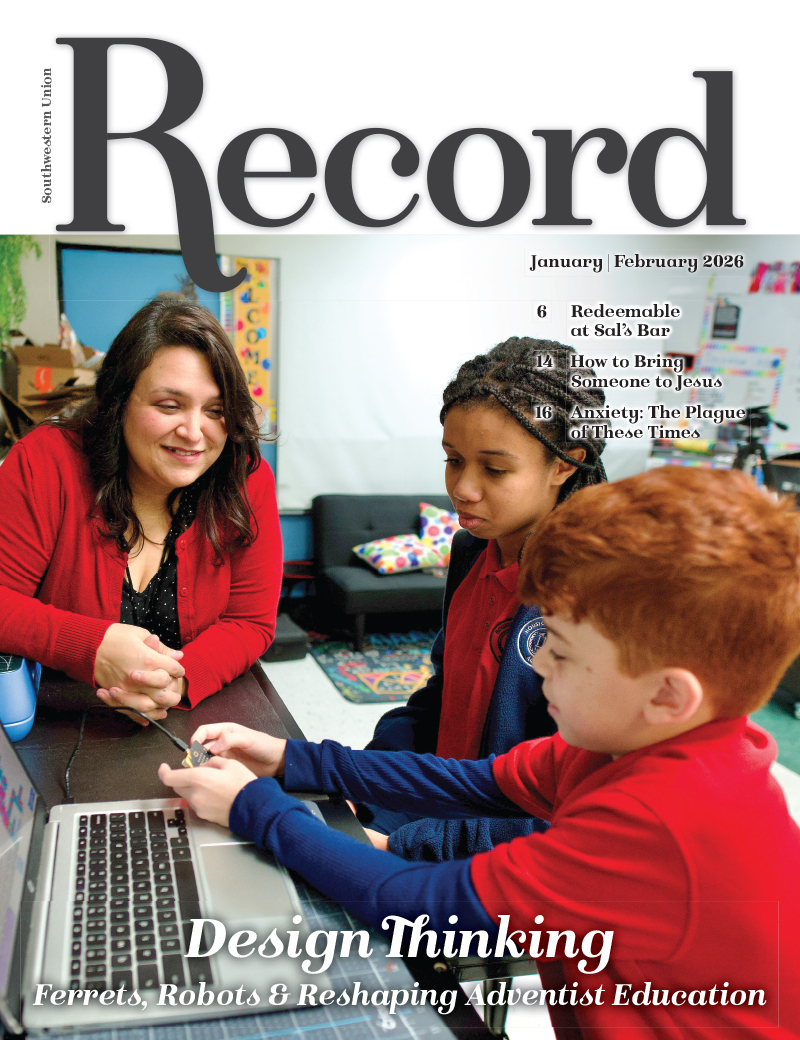From Local Service to Global Voice

The room was tense. Voices rose, tempers flared, and laughter—the cruel, dismissive kind—cut through the church’s walls. Mari Escudero sat on the edge of her seat. In her late teens, she was the youngest person in the room. In addition, she was the newest to the Seventh-day Adventist faith, having been baptized just a few years earlier along with her mother and brother. Born in Peru and raised in Mexico, Escudero had immigrated to the United States as a young teenager—shortly before discovering the Church that would shape her life.
Years later, that same young woman would find herself standing in a very different room—on the floor of a General Conference Session, participating in the Seventh-day Adventist Church’s world gathering. But her journey to global leadership began in church boardrooms where she first learned to listen for God’s voice.

Despite her age and newness to the faith, Escudero was the church’s Adventist Youth (AY) leader, a position that gave her a seat at the table with those expressing their disagreements with how the pastor was leading the church. Yet she felt uncomfortable with the tone of this particular conversation. It seemed as if God’s presence had left the room, and yet that Holy Spirit seemed to be prompting her to stand and speak.
Escudero stood to her feet. “Can we pray?” she asked, expressing her concern that her fellow church members were speaking disrespectfully to one of God’s servants. There were a few surprised glances and raised eyebrows, but the adults agreed to her request. They paused and prayed. Before the words “amen” were uttered, Escudero could sense God’s presence returning to the room. The conversation then continued with an appropriate level of respect.
That wasn’t the first time Escudero had felt compelled to seek God’s guidance in the midst of church conflict. When she was just 14 years old, a disagreement in her congregation left her unsettled. As a teenager who hadn’t been attending an Adventist church for very long, Escudero was at risk for becoming a spiritual victim of the controversy. Instead, Escudero sought to understand. She sat down and read the Seventh-day Adventist Church Manual cover to cover. What might have been the end of her spiritual journey became the foundation for her calling to church leadership.

Escudero’s decision to stay engaged with her church—to study the issues herself instead of walking away—set the tone for decades of service. In the years that followed, she served in nearly every department of her local congregation: from AY to club ministries, from women’s ministries to treasurer.
Eventually, she was invited to serve as an elder—a role she accepted with humility. “If it’s God’s will, there’s nothing that’s going to stop it,” she said, “but it’s a huge responsibility.” Knowing she would never succeed in serving as an elder without supernatural help, she committed to taking steps to deepen her relationship with God, praying and reading the Bible even more.
Then one year she was invited to be a delegate at the Texas Conference constituency meetings. “And that’s how everything started,” Escudero reflected.
Two years later, she was informed that she had been chosen for the Texas Conference Executive Committee. “It was such a great experience,” she recalled, “to see how the Church works at a different level.” She listened carefully to reports from secretaries, treasurers, and department leaders, gaining insight into the structure she had once studied so intently as a teenager.
Later, her name came up again—this time at the Southwestern Union. Serving on the union’s executive committee allowed her to step back even further and see how decisions and mission support operated across multiple conferences. The pattern was becoming clear: her faithful service at each level was preparing her for the next.

That became undeniable the day she received a phone call alerting her that the North American Division had just finished a meeting, and her name had been nominated to serve on its executive committee. Escudero was stunned. She was still processing this when she received an email confirming that she was also to sit on the General Conference executive committee. With this appointment, she now had the opportunity to serve at every level of the Church structure—from her local church, to the conference (which supports multiple churches in a region), the union (which coordinates several conferences), the division (which oversees unions across a continent) and the General Conference (the global administrative body of the Seventh-day Adventist Church).
“At that moment, I just cried,” she remembered. “What a privilege!”
Each step in leadership felt like confirmation of what her mother had always told her: “If you’re serving in this capacity, it’s because God is preparing you for something bigger.”

It was at a meeting in the General Conference building that the weight of her journey truly settled on her. Seated among seasoned church administrators—presidents, treasurers and secretaries—Escudero quietly looked around the room. Most of the other executive committee members were long established in the Church’s leadership structure, often connected by family, education or professional ministry.
And then there was Escudero.
“I remember thinking, ‘Who are you?’” she said. “You’re not anyone’s daughter, or cousin, or wife—not connected to anyone in leadership. But God has this plan for you.”
In that moment, a surge of emotion reaffirmed what she already believed: leadership isn’t about legacy or title. It’s about availability. It’s about willingness.
“The only thing I have to do,” she said, “is just obey.”
Though Escudero’s life has been defined by her service to the Church she loves, none of it has come with a paycheck. She has never worked as a denominational employee, she is a lay member. Instead, she’s built her career outside the Church, coordinating the rehabilitation department at a Houston hospital. Yet even while managing a demanding professional role, she has consistently said yes to volunteer leadership—at every level of the Church’s structure.

Escudero’s journey of service eventually brought her to one of her highest callings yet: serving as a delegate to the General Conference Session. She’s served not once, but twice—first at the scaled-back 2022 session (that had been postponed when the pandemic made having a worldwide gathering impossible), and again in July of this year in St. Louis.
This time, surrounded by thousands of Adventists from around the world, Escudero found herself swept up in the joy of reunion and worship. As she witnessed attendees embracing old friends, she turned to her pastor and said, “That’s how Heaven is going to be.”
Heaven holds not only the promise of reunion, but also of recognition—when the fruit of quiet, consistent service is finally made known. Perhaps that’s when Mari Escudero will discover just how far her influence reached.
By Lori Futcher. Futcher is the Record managing editor and associate communication director at the Southwestern Union. She lives in Keene, Texas, with her family. Mari Escudero is an elder at the Houston Spanish Spring Branch Seventh-day Adventist Church in the Texas Conference


